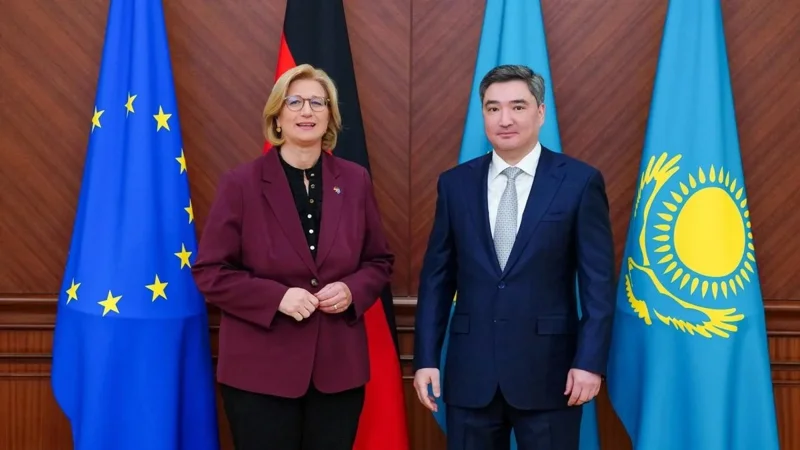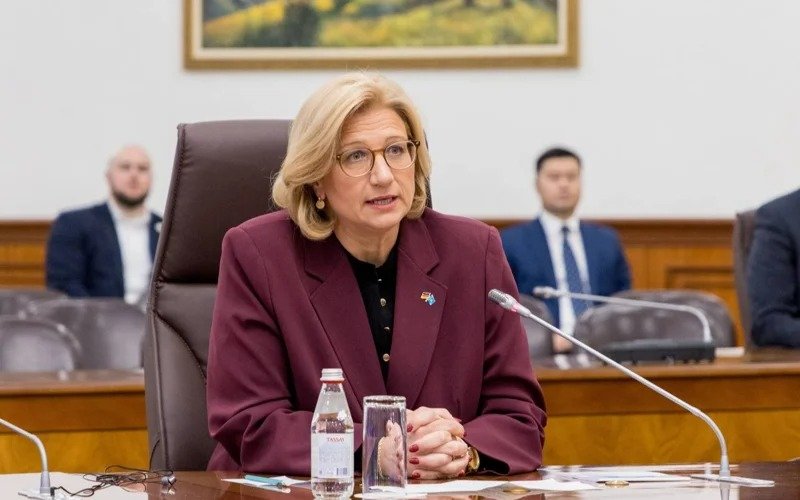Kazakhstan accounts for 81% of Germany's trade with Central Asia
Prime Minister Olzhas Bektenov has held today a meeting with the President of the Bundesrat of the Federal Republic of Germany, Anke Rehlinger, who arrived in Kazakhstan on an official visit, Kazinform News Agency learned from primeminister.kz.

The discussion focused on the development of trade and economic cooperation and strengthening collaboration in energy, metallurgy, geological exploration, industrial cooperation, transport and logistics, digital technologies, and more. Special attention was given to the implementation of agreements reached at the level of the heads of state.
Olzhas Bektenov and Anke Rehlinger discussed the plans to boost mutual trade. Kazakhstan is Germany's leading economic partner in Central Asia, accounting for 81% of Germany's total trade with the region. In the past year, trade turnover between Kazakhstan and Germany grew by 5.9%, reaching approximately $4 billion. At the same time, exports from Kazakhstan increased by 56.8% to $1.2 billion.
Investment cooperation was on agenda of the meeting as well. Since 2005, about $7.2 billion of direct German investments have been injected into Kazakhstan’s economy. More than 90% of these funds have been directed into the non-resource sector — including manufacturing, chemical production, construction materials, transport, and agriculture. The Kazakh-German joint investment portfolio includes 65 projects worth more than $54.4 billion. Approximately 1,100 enterprises with German capital operate in Kazakhstan. Thirty-two projects worth over $1.1 billion have been successfully completed.
Energy sector plays a key role in the economic relations between Kazakhstan and Germany. Kazakhstan ranks third in terms of oil exports to Germany. Last year, Germany imported 10.6 million tonnes of Kazakh oil. The parties also discussed the prospects for increasing the volume of oil supplies from Kazakhstan to Germany.
The talks also focused on the implementation of joint projects in hydrogen and green energy, cooperation in joint development of mineral resources, creation of advanced industrial clusters in special economic zones, and deep technological cooperation.
"Our goal is to build a strong industrial foundation and ensure economic self-sufficiency. We focus on accelerated development of the processing sector by creating high-value-added clusters. Priority areas include deep metal processing, petro-, gas- and coal-chemistry, heavy engineering, uranium conversion and enrichment, production of auto components and fertilizers. Kazakhstan has all the necessary factors that make it attractive to German businesses — diversified energy sources, transit and transport potential, and significant natural resources. We offer various tax and customs incentives for investors," Olzhas Bektenov emphasized.

Anke Rehlinger, President of the Bundesrat of the Federal Republic of Germany, expressed keen interest in strengthening trade and economic ties with Kazakhstan.
“We view your country with great interest as a key partner for us in Central Asia. We aim to maintain the positive momentum of our political dialogue and cultural-humanitarian interaction. Expanding economic cooperation is also of great importance to us. We see Kazakhstan primarily as a good partner,” Anke Rehlinger stated.
The sides highlighted importance of developing transport and logistics connectivity as a key factor for boosting trade and economic relations. Last year, cargo flows through the Middle Corridor to the EU countries, including Germany, exceeded 4.5 million tonnes. The expansion of Kazakhstan’s logistics capacities currently aligns with the interests of the entire European Union.
At the end of the meeting, both sides reaffirmed their commitment to strengthening mutually beneficial cooperation across all promising areas.
Earlier, it was reported that Prime Minister Olzhas Bektenov chaired a meeting of the Board of Directors of Baiterek National Managing Holding, focusing on real sector financing. The meeting highlighted the Holding’s ongoing efforts to improve businesses’ access to state support.
